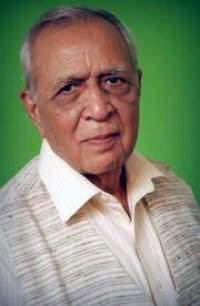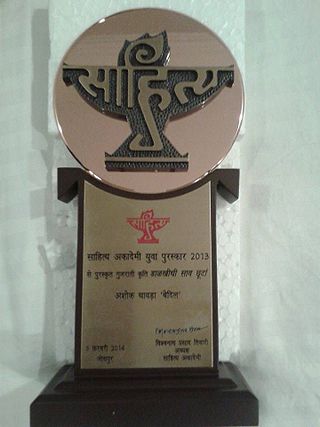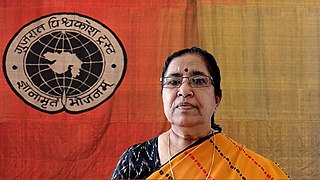Indian literature refers to the literature produced on the Indian subcontinent until 1947 and in the Republic of India thereafter. The Eighth Schedule to the Constitution of India has 22 officially recognised languages. Sahitya Akademi, India's highest literary body, also has 24 recognised literary languages.
Indian poetry and Indian literature in general, has a long history dating back to Vedic times. They were written in various Indian languages such as Vedic Sanskrit, Classical Sanskrit, Ancient Meitei, Modern Meitei, Telugu, Tamil, Odia, Maithili, Kannada, Bengali, Assamese, Urdu, and Hindi. Poetry in foreign languages such as English also has a strong influence on Indian poetry. The poetry reflects diverse spiritual traditions within India. In particular, many Indian poets have been inspired by mystical experiences. Poetry is the oldest form of literature and has a rich written and oral tradition.

The Jnanpith Award is the oldest and the highest Indian literary award presented annually by the Bharatiya Jnanpith to an author for their "outstanding contribution towards literature". Instituted in 1961, the award is bestowed only on Indian writers writing in Indian languages included in the Eighth Schedule to the Constitution of India and English, with no posthumous conferral.

The Sahitya Akademi, India's National Academy of Letters, is an organisation dedicated to the promotion of literature in the languages of India. Founded on 12 March 1954, it is supported by, though independent of the Indian government. Its office is located in Rabindra Bhavan near Mandi House in Delhi.

Harbhajan Singh was an Indian poet, critic, cultural commentator, and translator in the Punjabi-language. Along with Amrita Pritam, Harbhajan is credited with revolutionising the Punjabi poetry writing style. He published 17 collections of poems, including Registan Vich Lakarhara, 19 works of literary history and translated 14 pieces of literature of others including those of Aristotle, Sophocles, Rabindranath Tagore and selections from the Rig Veda.

Krishna Sobti was an Indian Hindi-language fiction writer and essayist. She won the Sahitya Akademi Award in 1980 for her novel Zindaginama and in 1996, was awarded the Sahitya Akademi Fellowship, the highest award of the Akademi. In 2017, she received the Jnanpith Award for her contribution to Indian literature.

Uday Prakash is a Hindi poet, scholar, journalist, translator and short story writer from India. He has worked as administrator, editor, researcher, and TV director. He writes for major dailies and periodicals as a freelancer. He has also received several awards for his collection of short stories and poems. With Mohan Das he received Sahitya Academi Awards in 2011. He is the first author to return his Sahitya Akademi award on Sep 3, 2015 against the killing of M. M. Kalburgi that initiated a storm of national protests by writers, artists,scholars and intellectuals. .

Shrilal Shukla was a Hindi writer, notable for his satire. He worked as a PCS officer for the state government of Uttar Pradesh, later inducted into the IAS. He has written over 25 books, including Raag Darbari, Makaan, Sooni Ghaati Ka Sooraj, Pehla Padaav and Bisrampur Ka Sant.

Padma Sachdev was an Indian poet and novelist. She was the first modern woman poet of the Dogri language. She also wrote in Hindi. She published several poetry collections, including Meri Kavita Mere Geet, which won the Sahitya Akademi Award in 1971. She also received the Padma Shri, India's fourth highest civilian award in 2001, and the Kabir Samman for poetry for the year 2007-08 given by Government of Madhya Pradesh, Saraswati Samman for the year 2015, Sahitya Akademi Fellowship in 2019.
Manubhai Pancholi also known by his pen name Darshak, was a Gujarati language novelist, author, educationist and politician from Gujarat, India. He participated in the Indian independence movement and held several offices after independence.

Bholabhai Patel was an Indian Gujarati author. He taught numerous languages at Gujarat University and did comparative studies of literature in different languages. He translated extensively and wrote essays and travelogues. He was awarded the Padma Shri in 2008.

Sitanshu Yashaschandra Mehta, better known as Sitanshu Yashaschandra, is a Gujarati language poet, playwright, translator and academic from India.

Raghuveer Chaudhari is a novelist, poet and critic from Gujarat, India. He has also worked as a columnist for numerous newspapers, such as Sandesh, Janmabhumi, Nirikshaka and Divya Bhaskar. He was a teacher at the Gujarat University until his retirement in 1998. His most significant contributions have been in Gujarati language but he has also written Hindi articles. He received the Sahitya Akademi Award in 1977, for his novel trilogy Uparvas. He received Jnanpith Award, considered to be India's highest literary award, in 2015. In 2019, he was awarded a D.Lit. by Gujarat University.

The Yuva Puraskar, also known as Sahitya Akademi Yuva Puraskar, is a literary honor in India which Sahitya Akademi, India's National Academy of Letters, annually confers on young writers of outstanding works in one of the 24 major Indian languages. Instituted in 2011, it recognises young writers under 35, with the aim of encouraging and promoting young writers. It comprises a cash prize of Rs. 50,000 and an engraved copper plaque.
Kamal Vora is a Gujarati language poet and editor from Mumbai, India. He is an editor of Etad, a quarterly Gujarati literary magazine.

Sharifa Vijaliwala is an Indian Gujarati language writer, critic, translator and editor from Surat, Gujarat, India. She is a recipient of a 2018 Sahitya Akademi Award for Vibhajanni Vyatha, a collection of critical essays in Gujarati, and has won several Gujarat Sahitya Akademi awards for her literary work.

Sahitya Akademi Translation Prize or Sahitya Akademi Prize for Translation is a literary honour in India, presented by Sahitya Akademi, India's National Academy of Letters, given to "outstanding translations of creative and critical works" in 24 major Indian languages such as English, Rajasthani, Punjabi and the 22 listed languages in the Eighth Schedule of the Indian Constitution recognised by the Sahitya Akademi, New Delhi.















